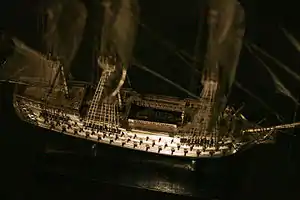French ship Iéna (1814)
The Iéna was a Commerce de Paris class 110-gun ship of the line of the French Navy.
 Silver scale model of the Commerce de Paris, sister-ship of the Iéna, on display at the Musée de la Marine in Paris. | |
| History | |
|---|---|
| Namesake: | Battle of Jena-Auerstedt |
| Builder: | Rochefort shipyard |
| Laid down: | 6 March 1805 |
| Launched: | 30 August 1814 |
| Commissioned: | 26 November 1814 |
| Decommissioned: | 31 December 1864 |
| General characteristics | |
| Class and type: | 110-gun Commerce de Paris class ship of the line |
| Length: | 62.5 m (205 ft) |
| Beam: | 16.3 m (53 ft) |
| Draught: | 8.1 m (27 ft) |
| Complement: | 1060 men |
| Armament: |
|
She was laid down on 6 March 1805 as Victorieux ("Victorious") at the Arsenal de Rochefort, but renamed Iéna on 23 February 1807, celebrating the French victory over Prussia in the previous autumn's Battle of Jena–Auerstedt. Following the Bourbon Restoration she was renamed Duc d'Angoulême, after Louis Antoine, son of the future King Charles X, and launched on 30 August 1814, entering service on 26 November. The next year, during the Hundred Days, she briefly took back the name of Iéna between March and July. On 9 August 1830, following the July Revolution, she changed name for the last time, back to Iéna.[1]
From 1839 Iéna was sent to the Levant as flagship of Admiral Lalande's squadron during the Oriental Crisis of 1840. From 1854 she took part in the Crimean War, initially stationed off Balchik, Bulgaria.[1] On 14 November, she was driven ashore in the Dardanelles.[2] After refloating, Iéna was converted in 1855 to a troopship with capacity for 1000 soldiers.[1]
Iéna was struck on 31 December 1864, and served as the central hulk for the Toulon reserve fleet until 1915.[1]
References
- Roche, Jean-Michel (2005). Dictionnaire des bâtiments de la flotte de guerre française de Colbert à nos jours, 1671–1870. Group Retozel-Maury Millau. p. 249. ISBN 978-2-9525917-0-6. OCLC 165892922.
- "Storm in the Black Sea". The Aberdeen Journal (5578). 6 December 1854. p. 6.